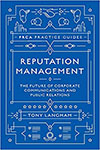
A SOUND reputation will further your business.
Warren Buffet once wrote to his managers that “We can afford to lose money – even a lot of money. But we can’t afford to lose reputation – even a shred of reputation.”
Reputation now accounts for 35% of the market value of the world’s 15 leading equity market indices according to the 2019 Reputation Dividend Report.
The companies that consistently have the best reputation across the G8 countries are Rolex and LEGO according to the Reputation Institute’s Global Rep Trak survey.
Both companies make great products and you can’t have a great reputation without being great, but that’s no longer enough to have a consistently strong reputation. Both companies also behave well as corporate citizens or at least aren’t widely known for behaving badly. Both seem authentic.
Lego’s purpose, according to CEO Niels Christiansen is “to inspire and develop the builders of tomorrow”. This is a lofty purpose, but it’s believable.
Rolex has committed to two long term philanthropic programmes to make the world a better place: The Rolex Awards for Enterprise and The Rolex Mentor and Protégé Arts Initiative, founded in 1976 and 2002, respectively.
Building On A Good Reputation
A good reputation is highly valuable.
LEGO’s six Frozen 2 products cost over US$300 if you buy all of them. Many of Rolex’s best selling Submariner range of watches retail for US$15,000 or more. Organisations with the best reputations can charge more for their products and services; they can recruit higher quality staff and sometimes even pay them less than their rivals do.
They can achieve more for each pound spent on marketing — and they can exert greater influence over governments. That’s why reputation has become one of the key discussions in the boardroom and at the top of government.
It surprises me that many businesses do not believe that reputation can be managed and needs to be managed. Some argue that by running their business well, they will get the reputation they deserve, even though this is clearly not always the case.
I believe that to fulfil their potential, the best companies have to be as good at managing reputation as they are at everything else.
It surprises me even more that many people in public relations are happy to see their role as covering communications only. It’s 30 years since Stephen Covey famously wrote, “you can’t talk your way out of a problem that you behaved yourself into”.
None of us in the profession roughly known as public relations can do our job of advising our organisations or our clients unless we understand reputation.
My favourite definition of reputation was developed by American academic and author, John Doorley. He states that reputation comes from performance + behaviour + communication, and it can only be sustained if an organisation is authentic and true to its purpose or to a set of values.
That says it all, and emphasises that reputation is primarily about performance and behaviour not communication.
To meet the demand from businesses and leaders for a better reputation, the best public relations professionals — and those students joining the industry now — need to focus on five areas for their organisations and clients:
1. Describe the organisation’s purpose in a way that is authentic
For everything else to work, an organisation has to describe its reason for existing (vision, purpose, mission, values) in a way that is unique to that organisation and credible. It’s too lazy to just say “integrity” and “excellence”.
A great example of a real set of values is the Goodwood Estate in England, the aristocratic home of vintage motor racing, amongst many other things. Its values are “obsession for perfection”; “the real thing”; “derring-do” and “sheer love of life”.

2. Ensure employees live the organisation’s purpose every day
In our uncontrollable world, everyone manages the organisation’s reputation, whether it’s the Chief Executive of BP or a flight attendant on United Airlines. Having a culture where people live the organisation’s values is the cornerstone of reputation management. Christine Lagarde, President of the European Central Bank and former Chairman of the International Monetary Fund, once said the right culture ensures that people “do the right thing” even when no one is watching.
3. Ensure the board behaves properly and makes the right decisions in a crisis
CEOs and Board Directors are human too. They will only “do the right” thing if their incentivisation aligns with the organisation’s purpose and values. Therefore, remuneration policy has to be set with reputation in mind.
In times of crisis it is vital that an organisation listens to the right people, so that the key decisions balance financial, legal and reputational issues. We now know that Boeing got it wrong after the first Max 737 crash in Ethiopia and should have grounded all planes then, rather than continuing to fly for six months until the second crash off Indonesia. We can all learn from other people’s mistakes.
4. Communicate openly and transparently with all key audiences
Great communication is now a vital part of being a great organisation. The British suffragettes, campaigning for votes for women in the early 20th Century, used to say that they wanted “deeds not words”. Nowadays, greatness requires deeds AND words.
5. Have a reputation management plan
Doing the four things above requires a plan that covers behaviour as well as communication. Hong Kong Jockey Club CEO Winfried Engelbrecht-Bresges says that “the reputation of sport is intrinsically and inexplicably linked to the integrity of that sport”. So the Club’s reputation management plan is all about ensuring integrity.
All organisations need a plan, bespoke to their particular situation.
In the 21st century, reputation will become accepted as being more important than money. The best performers will be those people, companies and governments that realise this – and decide to manage their reputation properly. The only PR people and corporate communicators asked to give advice at the highest level will be those that have become reputation managers.

Tony Langham is Co-founder and Chief Executive of reputation management consultancy Lansons, based in London and New York. He is the author of Reputation Management: The Future of Corporate Communications and Public Relations.





















